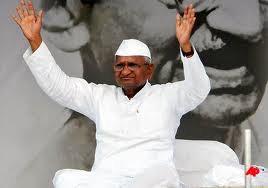
New Delhi, Apr 23: As fresh cracks appeared in Team Anna after the expulsion of a Muslim leader, Anna Hazare today said there is no rift in the group over the ''leakage'' of information or yoga guru Ramdev.
In his first reaction after the expulsion of Mufti Shameem Kazmi after he was allegedly found recording the proceedings of Core Committee meeting in Noida in UP, Hazare said that there is no fallout over the issue.
"There is no rift. What rift are you talking about? A team member who leaked information yesterday, there was a problem. People in our team had asked why he did so. So he said he would not come back," he told reporters.
"If there was a rift, they would have been fighting and there is no fallout," Hazare said.
Kazmi has claimed he quit the camp as the group was turning anti-Muslim.
Hazare also said there were no differences in the team over the participation of Ramdev in the anti-corruption movement.
"Right now, for over a month, I will tour Maharashtra. He has our support in his campaign against black money and we have his support on Jan Lokpal. We are all fighting together on tackling corruption," he said.
He said during the all-India tour, he and Ramdev will share stage wherever they meet. However, he said, there will be no joint tour.
His comments came amid growing unease in Team Anna over the "one-up manship" of Ramdev, with whom they had stitched an alliance to fight for the cause.
There were discussions on Team Anna's association with Ramdev, whom a section of the activists' believe has a "credibility crisis" due to allegations levelled against the yoga guru.
At the meeting yesterday, it was reiterated that there will not be a joint campaign with Ramdev but the two sides will extend support to each other in the fight against corruption.
Team Anna member and lawyer Prashant Bhushan said, "We have begun a movement against corruption and on that pretext, Ramdev supports us but we have no common platform or any consensus.
"We do have a consensus regarding these issues and common concerns regarding the country," he said.





Comments
Add new comment